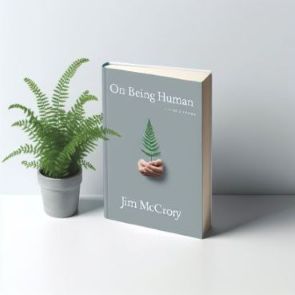
Image generated with Copilot
Every Story Has a Moral Heartbeat, Even if it’s Faint.
One enduring legacy my father left me before he passed away was an awareness of an objective morality that manifests itself in all aspects of life and, particularly, in literature. He would often say, "Every story has a moral heartbeat, even if it’s faint." Almost every tale worth telling has a moral denouement: the bad guy loses, the good guy wins. Otherwise, we, the readers, feel robbed. Why should that be? If we are creatures merely “dancing to our DNA” in a “mindless universe,” as Mr. Dawkins suggests, then why should we care about justice? Yet we do.
“The arc of the moral universe is long, but it bends toward justice,” Martin Luther King once said. His words point to a deeper truth: we live in a moral universe, an objective moral universe, whose reflection is cast in literature—stories large and small, stories that move and shape us, often without our conscious realization.
I was raised in the shipyard town of Govan, Glasgow. It was a gritty place, full of hard edges and hard lives. But it was also a place steeped in stories. Every corner seemed to have a tale, whether whispered in the darkened streets or spun at the kitchen table. My father loved stories, and he passed that love to me. He often brought books home—some from the library, others from dusty second-hand shops—and would leave them lying around, perhaps knowing that curiosity would get the better of me.
One day, when I was about ten years old, I found myself in The Modern Book Shop, a cramped little store that sold used books. Its narrow aisles smelled of old paper and damp wood, and I loved it. That particular day, I was drawn to a small book with a curious cover. The illustration depicted a wooden puppet with gangly limbs and wide, expressive eyes. Intrigued, I opened to the first page and read the following epigraph:
“Now it happened that Mr. Cherry, the carpenter, found a piece of wood that laughed and cried like a child.”
And so begins the hero’s journey: to become a real boy. The book, of course, was The Adventures of Pinocchio by Carlo Collodi.
Pinocchio’s story captivated me, not only because it was fantastical but because it felt profoundly true. Here was a puppet, brought to life, yearning to be more than he was. But he was stubborn, prone to lying, easily led astray by temptation. How human he seemed! Yet, at the heart of his journey lay a moral truth: to become a “real boy,” he had to learn courage, selflessness, and integrity. These weren’t arbitrary rules; they were the keys to a meaningful existence. Even as a child, I sensed the weight of this lesson. The story spoke to something deep within me, something my father had often hinted at: the idea that life has a moral fabric, and we are called to live in harmony with it.
Years later, as an adult, I would come to see Pinocchio’s journey as a metaphor for the human condition. Like him, we are all, in a sense, trying to become “real.” We wrestle with our flaws, stumble down wrong paths, and face moments of reckoning. And like Pinocchio, we find that the road to authenticity is paved with choices that test our character.
This notion of an objective morality—a moral compass embedded in the universe—has stayed with me throughout my life. It’s why I find it impossible to believe that morality is merely a human construct. If that were true, why would stories like Pinocchio resonate so universally? Why would we instinctively root for justice, even in fictional worlds? There is something within us that recognizes goodness and beauty and truth—not as inventions, but as reflections of a greater reality.
My father never used grand theological terms to explain this. He didn’t need to. He simply lived it, and he pointed it out in the stories we shared. Whether it was the selflessness of Sydney Carton in A Tale of Two Cities or the triumph of Aslan in The Chronicles of Narnia, he saw these narratives as echoes of the ultimate story: the triumph of good over evil, of light over darkness.
Now, as I reflect on my father’s legacy, I realize how deeply it shaped my own journey. The books he left behind, the stories he loved, and the truths he pointed me toward have become part of who I am. Like Pinocchio, I am still on the road to becoming “real,” still learning what it means to live with courage, selflessness, and integrity. And though my father is no longer here to guide me, his lessons remain—woven into the fabric of my life, much like the moral arc he so passionately believed in.
In the end, it seems fitting that the stories we cherish are not just about heroes and villains, but about us. They remind us that we live in a moral universe, one where justice matters, where truth endures, and where, even in the face of darkness, the light finds a way to shine.